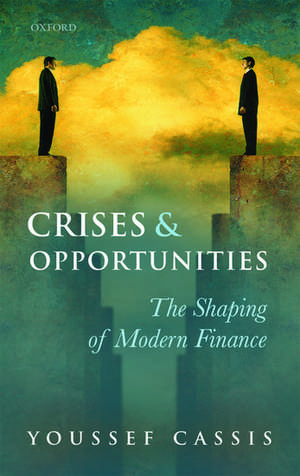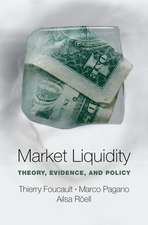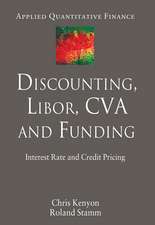Crises and Opportunities: The Shaping of Modern Finance
Autor Youssef Cassisen Limba Engleză Hardback – 7 apr 2011
| Toate formatele și edițiile | Preț | Express |
|---|---|---|
| Paperback (1) | 243.89 lei 31-37 zile | |
| Oxford University Press – 13 mar 2013 | 243.89 lei 31-37 zile | |
| Hardback (1) | 436.32 lei 31-37 zile | |
| OUP OXFORD – 7 apr 2011 | 436.32 lei 31-37 zile |
Preț: 436.32 lei
Preț vechi: 537.43 lei
-19% Nou
Puncte Express: 654
Preț estimativ în valută:
83.52€ • 90.75$ • 70.20£
83.52€ • 90.75$ • 70.20£
Carte tipărită la comandă
Livrare economică 11-17 aprilie
Preluare comenzi: 021 569.72.76
Specificații
ISBN-13: 9780199600861
ISBN-10: 0199600864
Pagini: 218
Ilustrații: None
Dimensiuni: 149 x 222 x 23 mm
Greutate: 0.44 kg
Editura: OUP OXFORD
Colecția OUP Oxford
Locul publicării:Oxford, United Kingdom
ISBN-10: 0199600864
Pagini: 218
Ilustrații: None
Dimensiuni: 149 x 222 x 23 mm
Greutate: 0.44 kg
Editura: OUP OXFORD
Colecția OUP Oxford
Locul publicării:Oxford, United Kingdom
Recenzii
Youssef Cassis attempts to describe and explain the nature of modern bank crises: what creates them, why they happen and how they are resolved. This is a challenging subject for any study, and Cassis effortlessly carries it off ... The book greatly aids our understanding of financial crises.
This is a book on the financial crisis that is both timely and Judicious. His sure historical grasp gives Youssef Cassis a unique insight into the links between financial crises and major shifts in regulatory and governance structures.
In his earlier work Youssef Cassis has shown deep understanding of the dynamics of financial centres. Here he turns he attention to an anatomy of financial crises in the 20th century, where his analysis is acute and his insights are penetrating.
If the financial crisis has a silver lining, it is that it has heightened appreciation of the importance of financial history. In this book Youssef Cassis, our preeminent historian of banking and finance, illustrates why this is the case. Newcomers will find an accessible introduction to the history of financial crises, while specialists will find much that is new and novel. Recommended to both.
This is a book on the financial crisis that is both timely and Judicious. His sure historical grasp gives Youssef Cassis a unique insight into the links between financial crises and major shifts in regulatory and governance structures.
In his earlier work Youssef Cassis has shown deep understanding of the dynamics of financial centres. Here he turns he attention to an anatomy of financial crises in the 20th century, where his analysis is acute and his insights are penetrating.
If the financial crisis has a silver lining, it is that it has heightened appreciation of the importance of financial history. In this book Youssef Cassis, our preeminent historian of banking and finance, illustrates why this is the case. Newcomers will find an accessible introduction to the history of financial crises, while specialists will find much that is new and novel. Recommended to both.
Notă biografică
Professor of Economic History, European University Institute, Florence. His work mainly focuses on banking and financial history, as well as business history more generally. His numerous publications on the subject include City Bankers, 1890-1914 (1994), Big Business: The European Experience in the Twentieth Century (1997), and Capitals of Capital: A History of International Financial Centres, 1780-2005 (2006).
















